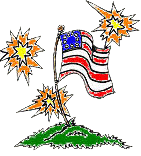



Fall 2005

|
For some American-born citizens living in the United States, this is only a foreign concept – a custom of ,far-off lands. These American citizens may have no knowledge of limits of the freedom of ideas and, if they do, their concept is usually limited to images found on television or in print. When the Constitution was signed in 1787 the purpose was to protect freedoms. To get the Constitution ratified, however, it was necessary to include the Bill of Rights, which offered other protections to the citizens who were slightly apprehensive about their government because of the regulations that had been placed on them by Great Britain. The First Amendment is one piece of this safehold written into the document by the founding fathers. The First Amendment says that
However, there are a few limitations to the power of free speech. The government has the responsibility to protect the rights and reputation of others. This means that people are not allowed to speak slanderously or print libelously statements that are not true about another person, place, or company while knowing these facts are untrue. The term “knowing” is especially important because one must show intent to do personal harm. |
